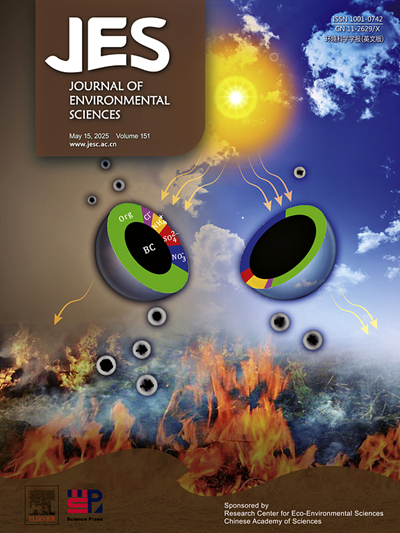Decoupling of diversity and network complexity of bacterial communities during water quality deterioration
IF 5.9
2区 环境科学与生态学
Q1 ENVIRONMENTAL SCIENCES
引用次数: 0
Abstract
Numerous studies have examined the impact of water quality degradation on bacterial community structure, yet insights into its effects on the bacterial ecological networks remain scarce. In this study, we investigated the diversity, composition, assembly patterns, ecological networks, and environmental determinants of bacterial communities across 20 ponds to understand the impact of water quality degradation. Our findings revealed that water quality degradation significantly reduces the α-diversity of bacterial communities in water samples, while sediment samples remain unaffected. Additionally, water quality deterioration increases the complexity of bacterial networks in water samples but reduces it in sediment samples. These shifts in bacterial communities were primarily governed by deterministic processes, with heterogeneous selection being particularly influential. Through redundancy analysis (RDA), multiple regression on matrices (MRM), and Mantel tests, we identified dissolved oxygen (DO), ammonium nitrogen (NH4+-N), and C/N ratio as key factors affecting the composition and network complexity of bacterial communities in both water and sediment. Overall, this study contributes a novel perspective on the effect of water quality deterioration on microbial ecosystems and provides valuable insights for improving ecological evaluations and biomonitoring practices related to water quality management.

求助全文
约1分钟内获得全文
求助全文
来源期刊

Journal of Environmental Sciences-china
环境科学-环境科学
CiteScore
13.70
自引率
0.00%
发文量
6354
审稿时长
2.6 months
期刊介绍:
The Journal of Environmental Sciences is an international journal started in 1989. The journal is devoted to publish original, peer-reviewed research papers on main aspects of environmental sciences, such as environmental chemistry, environmental biology, ecology, geosciences and environmental physics. Appropriate subjects include basic and applied research on atmospheric, terrestrial and aquatic environments, pollution control and abatement technology, conservation of natural resources, environmental health and toxicology. Announcements of international environmental science meetings and other recent information are also included.
 求助内容:
求助内容: 应助结果提醒方式:
应助结果提醒方式:


